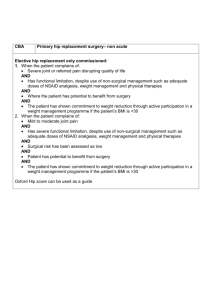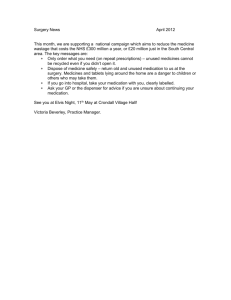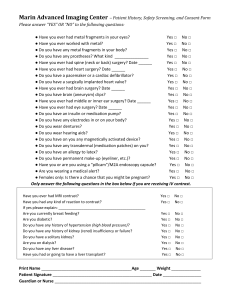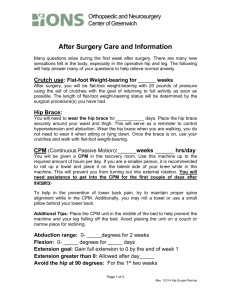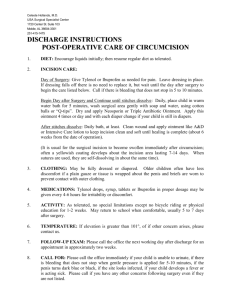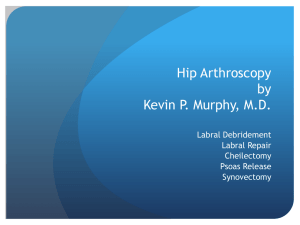Hip Arthroscopy - Chippewa Valley Orthopedics and Sports Medicine
advertisement
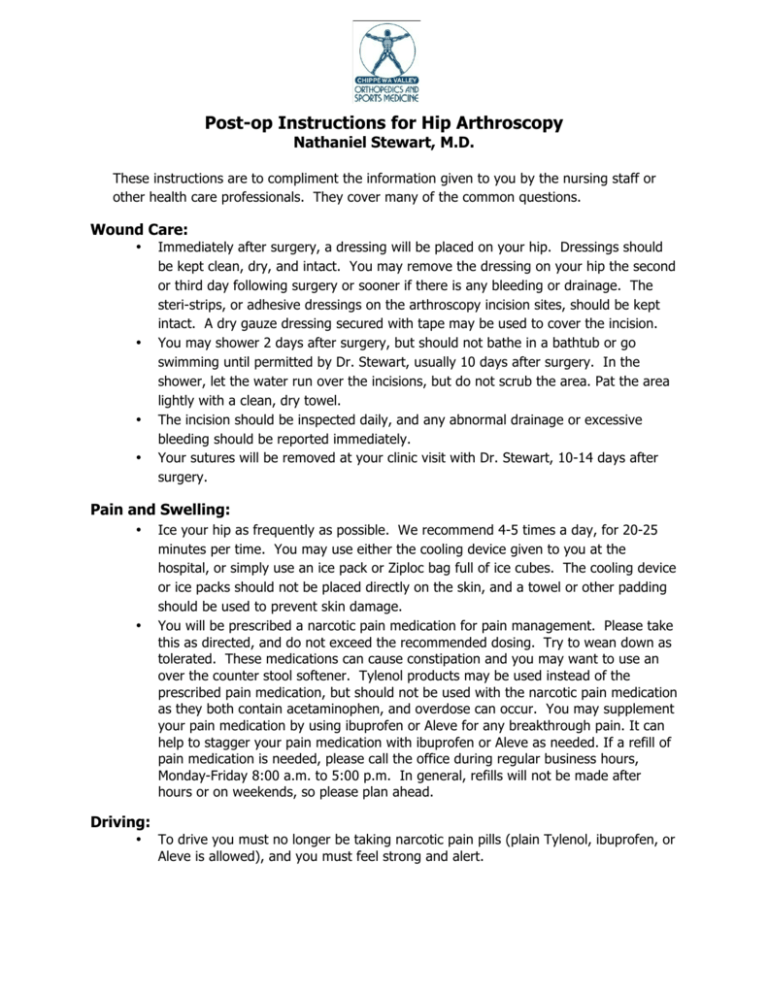
Post-op Instructions for Hip Arthroscopy Nathaniel Stewart, M.D. These instructions are to compliment the information given to you by the nursing staff or other health care professionals. They cover many of the common questions. Wound Care: • • • • Immediately after surgery, a dressing will be placed on your hip. Dressings should be kept clean, dry, and intact. You may remove the dressing on your hip the second or third day following surgery or sooner if there is any bleeding or drainage. The steri-strips, or adhesive dressings on the arthroscopy incision sites, should be kept intact. A dry gauze dressing secured with tape may be used to cover the incision. You may shower 2 days after surgery, but should not bathe in a bathtub or go swimming until permitted by Dr. Stewart, usually 10 days after surgery. In the shower, let the water run over the incisions, but do not scrub the area. Pat the area lightly with a clean, dry towel. The incision should be inspected daily, and any abnormal drainage or excessive bleeding should be reported immediately. Your sutures will be removed at your clinic visit with Dr. Stewart, 10-14 days after surgery. Pain and Swelling: • • Ice your hip as frequently as possible. We recommend 4-5 times a day, for 20-25 minutes per time. You may use either the cooling device given to you at the hospital, or simply use an ice pack or Ziploc bag full of ice cubes. The cooling device or ice packs should not be placed directly on the skin, and a towel or other padding should be used to prevent skin damage. You will be prescribed a narcotic pain medication for pain management. Please take this as directed, and do not exceed the recommended dosing. Try to wean down as tolerated. These medications can cause constipation and you may want to use an over the counter stool softener. Tylenol products may be used instead of the prescribed pain medication, but should not be used with the narcotic pain medication as they both contain acetaminophen, and overdose can occur. You may supplement your pain medication by using ibuprofen or Aleve for any breakthrough pain. It can help to stagger your pain medication with ibuprofen or Aleve as needed. If a refill of pain medication is needed, please call the office during regular business hours, Monday-Friday 8:00 a.m. to 5:00 p.m. In general, refills will not be made after hours or on weekends, so please plan ahead. Driving: • To drive you must no longer be taking narcotic pain pills (plain Tylenol, ibuprofen, or Aleve is allowed), and you must feel strong and alert. Exercises/Activity: • • • • • Range of motion exercises of the hip should begin as soon as possible after surgery, and should be done 4-5 times per day for the first week. A CPM, or a continuous passive motion device, will be prescribed for certain arthroscopic hip procedures. The machine will be set to flex your hip up to 40-60 degrees. The amount of flexion does not need to be increased. Immediately after surgery while you are primarily resting, the CPM is to be used three times a day with sessions lasting up to two hours. As your mobility increases, the CPM machine use can be reduced. Other exercises will be specified on the hip arthroscopy rehab prescription sheet, and should be done as directed. Crutches are required for the first week after surgery. Try to avoid being up on the hip, such as standing or walking, for lengthy periods of time in the first week. Return to work is variable depending on the type of employment, and should be discussed with Dr. Stewart at your clinic appointment. Follow-up: • You will see Dr. Stewart in the office 10-14 days after surgery. Adverse Signs or Symptoms: Occasionally patients experience troubles after surgery and need additional medical attention. Such conditions that require medical attention include the following: • • • Fever of greater than 101 degrees F New or different colored drainage from your surgical incision Chest pain or shortness of breath Seek medical attention immediately if you develop sudden chest pain, shortness of breath, a rapid heartbeat, lightheadedness or dizziness. Questions/Concerns: If you have any additional questions or concerns, please feel free to call our office, MondayFriday, 8:00 a.m.-5:00 p.m. Nathaniel Stewart, M.D. Chippewa Valley Orthopedics & Sports Medicine (715) 832-1400 or (715) 723-8514, or 800-322-1747. 07/2011
